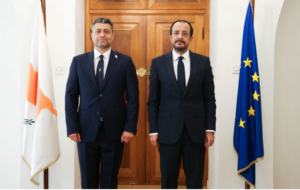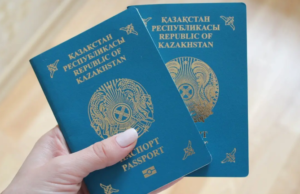
Ivan Vyhivskyi, head of the National Police of Ukraine, and Itamar Ben Gvir, Minister of National Security of the State of Israel, had a conversation about preparations for this year’s Hasidic pilgrimage to Uman (Cherkasy region).
“The main topic of the conversation was preparation for this year’s Hasidic pilgrimage to Uman and coordination of efforts to prepare and ensure law enforcement measures in places of gathering of pilgrims,” the Embassy of Ukraine in Israel reported on Tuesday.
The parties agreed to work closely together to agree on the necessary measures during the pilgrimage and coordinate actions on the spot.
Vygivsky thanked his Israeli counterpart for mutual understanding and emphasized the importance of attracting sufficient law enforcement forces from the Israeli side to strengthen the capabilities of Ukrainian law enforcement, given the challenges and threats posed by Russian armed aggression.
“The parties agreed to continue interaction and develop the established cooperation,” the statement said.
Every year, Ukraine hosts tens of thousands of pilgrims to celebrate the Jewish New Year in Uman. This year, Ukraine and Israel have established an effective pragmatic dialogue to ensure a safe pilgrimage under martial law and to take the necessary measures to maintain law and order during the festivities.
The Embassy expressed its gratitude to Minister Gvir for his personal attention to the issue of jointly organizing this year’s Hasidic pilgrimage to Ukraine.
In 2025, the holiday will be celebrated from September 22 to 24.
https://interfax.com.ua/news/diplomats/1104960.html

The Embassy of the Republic of Uzbekistan invites interested persons to visit the international exhibition “HoReCa Expo Uzbekistan 2025”, which will be held from October 21 to 23, 2025 in Tashkent at the “Uzexpocentre”.
The exhibition will showcase modern technologies and equipment for hotels, restaurants, catering and trade.
Visitors to HoReCa Expo Uzbekistan will be offered a full range of kitchen equipment, food and beverage products, furniture, textiles, IT solutions, security systems and many other solutions.
The main theme of the exhibition “Investments in service and comfort: business solutions for HoReCa” will include sessions on the following topics:
Exhibitors and guests of the exhibition will have the opportunity to get acquainted with the latest trends in the hospitality industry, establish contacts with key market representatives, new suppliers, partners and investors within the framework of organized B2B and B2C meetings, take part in master classes and seminars by international experts, and discover the latest innovations in the HoReCa sector.
For more details and registration, please follow the link.
INFORMATION FOR BUSINESS REPRESENTATIVES
For the attention of Ukrainian business representatives interested in establishing business relations with Uzbekistan, please find below some commercial offers for the supply of Uzbek goods and promising investment projects for consideration:
Commercial offers – http://bit.ly/4k1wNkk
Investment projects – http://bit.ly/3HRnPJ4
Exhibitions and fairs – http://bit.ly/4lczZKQ
If you have any questions, you can contact the Commercial Section of the Embassy of the Republic of Uzbekistan in Ukraine at the following contact details:
e-mail: info@uzbekistan.org.ua
tel.: +380445014184, +380445015000

The Moldovan government is preparing to build a high-speed highway that will connect the border with Romania and run to Odesa. Doina Nistor, Deputy Prime Minister and Head of the Ministry of Economy of Moldova, said this at the opening of Moldova Business Week.
Currently, a feasibility study is being prepared to determine the possible route of the road and whether parts of the new route will use existing roads.
In addition, Moldova is modernizing both rail and road corridors. The feasibility study for the Ungheni-Chisinau-Odesa corridor is scheduled to be completed by the end of 2025.
The road will be of particular importance for Ukraine’s reconstruction, as it will help shorten routes, reduce logistics costs and increase the resilience of supply routes.
Once the feasibility study is completed, a final decision on the route and construction details will be made. The project will depend on funding, international support, and cooperation between the governments of Moldova and Ukraine (and possibly Romania).

Ukrainian Ambassador Extraordinary and Plenipotentiary to the Republic of Cyprus Serhiy Nezhynskyy in Nicosia has presented the original credentials signed by Ukrainian President Volodymyr Zelenskyy to Cypriot President Nicos Christodoulidis. This was reported by the Embassy of Ukraine on its Facebook page.
Cyprus will act as the next President of the Council of the European Union.
In his speech, the Ambassador of Ukraine thanked President Christodoulidis for his unwavering support of Ukraine and expressed hope for a mutually beneficial partnership, which will further strengthen ties between Ukraine and Cyprus.
The President of Cyprus, in turn, emphasized the maximum support for the independence of Ukraine and the European course of the country.

Dog and cat owners over the age of 50 show a slower decline in cognitive function compared to those who do not have pets. This is according to the results of a large-scale European study published in the journal Scientific Reports (Nature).
Scientists have found that dog owners retain their memory longer, while cat owners lose their speech activity more slowly. Researchers attribute this to several factors. Interacting with animals requires constant engagement and serves as a kind of “mental training.” For example, contact with a dog activates the prefrontal cortex of the brain, enhancing attention and emotional response. Cats, thanks to their unpredictability, stimulate areas associated with speech and thinking.
Ownership of birds or fish, as the study showed, had no statistically significant association with slowing cognitive decline.
The analysis was based on data from eight waves of the Survey of Health, Ageing and Retirement in Europe (SHARE) between 2004 and 2022. The sample included people aged 50 and older. Cognitive functions were assessed in two main areas: episodic memory (the ability to remember and reproduce both immediate and delayed events) and executive functions (e.g., verbal fluency—the ability to quickly select words from a specific category).
According to the authors, the results obtained may be useful in developing policies in the field of “healthy aging.” In particular, this refers to supporting programs that facilitate the conditions for elderly people to keep pets, as well as including this topic in government and social initiatives for care and psychological support.

Kazakhstan has issued its first 10-year residence permit under the Digital Nomad Residency program. The recipient is Pavel Filatov, a senior analyst and BI (business intelligence) specialist with international experience. The Astana Times
The program has been in effect since January by decree of President Kassym-Jomart Tokayev and is aimed at attracting leading specialists in digital technologies and artificial intelligence.
Applications are submitted online through the Astana Hub international innovation cluster. The cluster’s specialists accompany candidates through all stages, from submitting documents to obtaining a residence permit in accordance with Kazakhstani law. To date, more than 270 applications have been received from about 20 countries (the US, Canada, France, Turkey, CIS countries, etc.). Most applicants are professionals in programming, cybersecurity, UI/UX design, and DevOps.
Kazakhstan also offers two types of visas for remote workers: